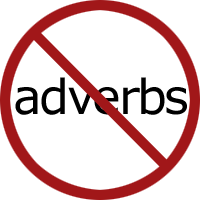Every day this week I’ll be posting a new article on common mistakes screenwriters make.
 Today’s topic is adverbs — you know, those flowery words that usually end in “ly.” Words like: quickly, haphazardly, vastly, very, annoyingly… etc. They describe verbs or adjectives. These words are great if you’re writing a novel, but they can brand you as an amateur if you use them extensively in your scene description. (In the last script I wrote, I didn’t use a single one)
Today’s topic is adverbs — you know, those flowery words that usually end in “ly.” Words like: quickly, haphazardly, vastly, very, annoyingly… etc. They describe verbs or adjectives. These words are great if you’re writing a novel, but they can brand you as an amateur if you use them extensively in your scene description. (In the last script I wrote, I didn’t use a single one)
“But why?” you ask eagerly. “I genuinely love adverbs. They give me that wonderfully fuzzy feeling.”
It’s simple. It’s often the mark of a lazy screenwriter. Our job is to write only what you can see and hear, in a succinct, clever and accurate way. That requires coming up with the perfect verb or adjective to describe the scene. And usually that’s enough.
Instead of:
The Grinch moves stealthily across the floor like a frighteningly evil cat.
You could use:
The Grinch creeps across the floor like a demonic cat.
Or:
The Grinch slinks across the floor like a possessed cat.
You get the idea. Get rid of the adverbs if you can and use better verbs and adjectives. I could have just eliminated “stealthily” and kept “moves,” but “moves” is too simple of a verb. We’ll talk more about that tomorrow.
Sometimes, though, you can simply eliminate the adverb and still achieve the same effect. In a script I read recently, the writer had used something like, “… grossly gnarled hand.” If a hand is gnarled, the “grossly” part is redundant. After all, I’ve never seen a beautifully gnarled hand.
Remember, the no-adverb rule only applies to scene description. Go nuts in dialogue, etc. if it feels authentic.





Really nice pointer. This is really helpful to all up and coming screenwriters. Perhaps, this site could one day become a meeting site for screenwriters to connect, share ideas and maybe even to partner together. Great work Trevor !
Thanks Sri! That’s what I’m hoping.